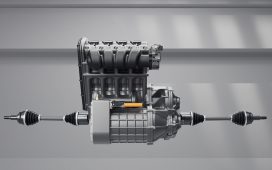We must also consider drivetrain loss. Gas-powered engines aren’t particularly good at getting the latent power out of fossil fuel. In the industry, that’s known as thermal efficiency, and it’s basically how much of the gas’ power is converted to energy and how much is converted into heat.
The most thermally efficient engine in production is Toyota’s Dynamic Force 2.0-liter naturally aspirated four-cylinder, running a 13.0:1 compression ratio. It operates at 40% thermal efficiency, which means that for every gallon of fuel you use, 60% is converted to heat.
An electric motor operates at 98%, so using this unique hybrid setup gives you a lot more out of the fuel. This year, the RS e-tron was already run on partially synthetic fuel, but there’s no reason it can’t use Porsche’s synthetic fuel, which is entirely guilt-free.
What it boils down to is a 2.0-liter turbocharged motor revving at 4,500 rpm results in a combined power output of 670 hp at the wheels, though Audi has to limit the power to 400 horses because of the FIA’s Rally-Raid rules.









